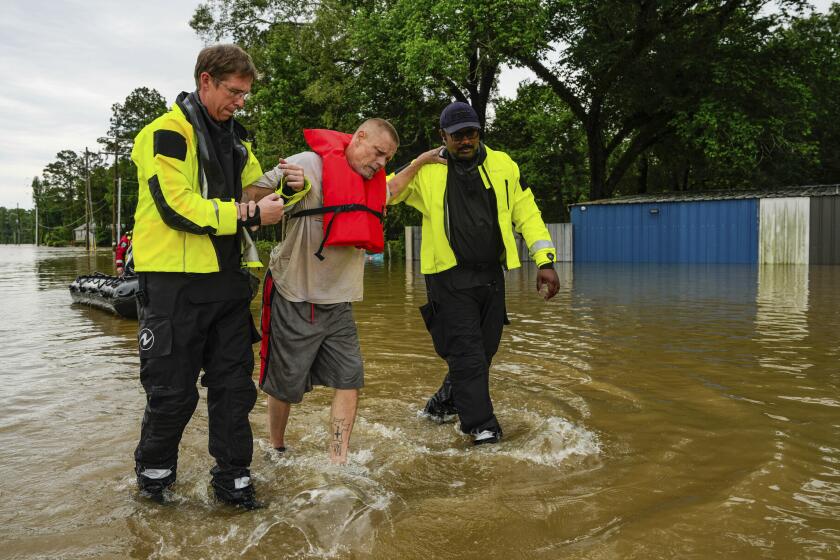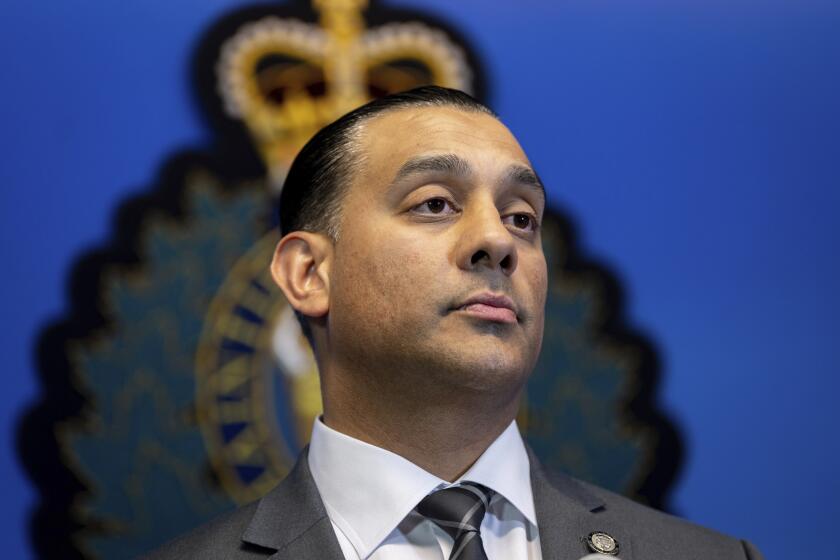NEWS ANALYSIS : Reversion to Political Intolerance Seen in Seoul’s Indictment of Kim
Nearly a year after South Korea put on the Olympic Games and proudly displayed to the world its vibrant economy and fledgling democracy, the government appears to be turning the clock back to darker days of political intolerance.
The country’s most prominent opposition leader, Kim Dae Jung, was indicted Friday for violating the National Security Act, a Draconian anti-Communist law that until a few months ago was ostensibly a target for revision under President Roh Tae Woo’s program of democratic reform.
In fact, ruling and opposition party members deliberating over how to improve the law considered abolishing the very clause under which Kim was indicted. It requires South Koreans to inform authorities of any pro-Communist activity that comes to their attention.
Prosecutors accused Kim, 63, of violating the law by failing to inform on a National Assembly member of his Party for Peace and Democracy, Suh Kyong Won, who secretly visited North Korea last year--and now stands accused of espionage.
If tried and convicted, Kim could face up to five years in prison on the national security charge, plus another 10 years on an additional count of breaking foreign exchange laws by failing to report $10,000 in North Korean currency he allegedly received from Suh.
Suh could be threatened with the gallows, as Kim was when he was convicted in 1980 on sedition charges, now accepted as fabricated, in connection with an uprising at Kwangju. Kim’s death sentence was commuted under international pressure, and his civil rights were restored in time for him to challenge Roh and two opposition rivals in the 1987 presidential election.
Now again on the criminal docket, Kim--who was not arrested pending trial--has vehemently denied receiving any money from Suh or having any knowledge of his trip to North Korea before it became public in June.
‘Lot of Holes in the Case’
“There are some disquieting elements in this, such as allegations that witnesses have been tortured,” said a Western diplomat based in Seoul, who spoke on the condition of anonymity. “From all appearances, there are an awful lot of holes in the case.”
Along with Suh, seven others have been arrested in the case, and four persons, including Kim and his party’s floor leader, have been indicted but not been detained.
Kim accuses the government of fabricating the charges to discredit his political party. Government officials contend that the prosecutors are acting independently and without political motives.
The prosecutor’s office in South Korea does not have a reputation for nonpartisanship, much as the court system had little integrity during several decades of military-backed dictatorship before Roh’s inauguration.
“The hard-line faction in the (ruling) Democratic Justice Party seems to have determined it can use the Suh case to cripple Kim Dae Jung,” the Western diplomat said.
Kim, on the other hand, has “declared war” against Roh and the government and vowed to fight the national security charges in court. He planned to organize a rally today near Inchon, west of Seoul, to protest the indictment.
“Mine is not an isolated case. . . . It shows the Roh government has abandoned the cause of democratization,” Kim said at a news conference today.
“They have returned to the old era. . . . Even the ruling party is at the mercy of the security agencies now. Torture is popular again and the accused are denied legal counsel.”
Backtracking on Reforms
Kim’s indictment comes amid signs that the government is back-tracking on democratic reforms on several other fronts:
-- The Korean National Council of Churches reported last month that more than 800 political prisoners are behind bars, despite a series of highly publicized amnesties since Roh became president in February, 1988. As many as 625 of these prisoners were arrested between Dec. 21, 1988, and the end of June, the council said. However, the totals include some suspects connected to violent incidents who might not be classified as prisoners of conscience in the West.
-- Freedom of the press has been dealt a chilling blow as the government suppresses attempts by ordinary citizens to communicate with or travel to North Korea. The editor of Hankyoreh, a progressive daily newspaper that was established after Roh lifted press restrictions last year, was arrested for planning--but not carrying out--a project to send a reporting team to Pyongyang.
-- The status of Chun Doo Hwan, the former authoritarian president and military strongman, has been in limbo since he made a dramatic retreat from the capital to a mountain temple last November. The opposition-dominated National Assembly has been unable to force him to emerge and testify about allegations of corruption during his eight years in power.
-- Roh’s bold and visionary “July 7 proclamation,” a sweeping proposal he made last summer that was to reconcile more than four decades of hostility with the Communist north, has been all but forgotten in the shrill ideological crackdown on purported North Korean sympathizers, triggered by the secret visit of a dissident South Korean clergyman to Pyongyang in March. North-south talks that began in a spirit of bickering detente before last year’s Olympics have been scrapped. Seoul has rejected overtures by Pyongyang to reopen the dialogue, saying the other side “lacks sincerity” because it has encouraged illegal visits by South Korean citizens naively attempting free-lance diplomacy to promote reunification.
Roh renewed his conciliatory tone toward the north in a speech marking the Aug. 15 anniversary of Japan’s surrender in World War II, which led to the division of the peninsula between U.S. and Soviet spheres of influence.
On the same day Im Su Kyong, a 20-year-old student who illegally visited Pyongyang to attend the World Festival of Youth, crossed back into the south by way of Panmunjom in the demilitarized zone and was quickly arrested and swept away in a helicopter.
As conspicuous as all these events is the absence of the widespread social protest that toppled Chun and his repressive regime in 1987. The mood in the streets is conservative these days, as the country’s “miracle” economy slows down to single-digit growth for the first time in several years and nagging uncertainty sets in about continued prosperity. The government would have it that South Koreans are fed up with the exhausting catharsis of confrontational politics, and seek stability.
More to Read
Start your day right
Sign up for Essential California for news, features and recommendations from the L.A. Times and beyond in your inbox six days a week.
You may occasionally receive promotional content from the Los Angeles Times.






